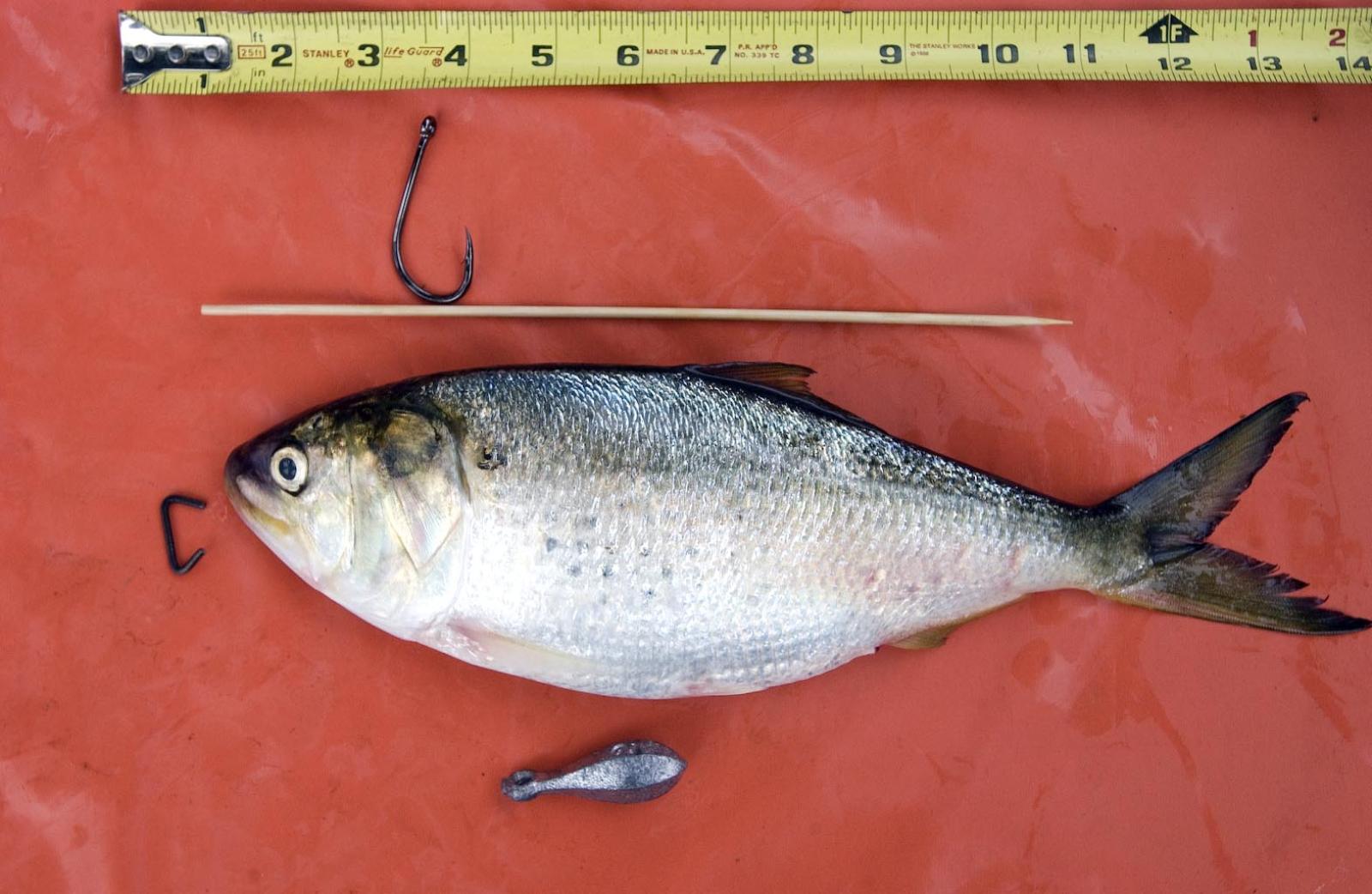Two leading Island recreational fishing organizations have called on the state Division of Marine Fisheries to end the controversial practice known as yo-yoing, which laces bait fish with lead that ends up in the bellies of striped bass.
The Martha’s Vineyard Surfcasters Association and the Martha’s Vineyard Striped Bass and Bluefish Derby have written separate letters to DMF director Paul Diodati raising concerns that the practice is having a harmful impact on fish, is a public health hazard and lowers consumer confidence in what has historically been considered a pristine resource.
“We request that [the DMF] take immediate action to permanently ban the use of the technique . . . by both commercial and recreational anglers,” wrote Jeff Sayre, president of the surfcasters association, in a Nov. 15 letter.
“We urge you to address this potentially dangerous health issue for all of us in the commonwealth who eat these fish,” wrote derby president Edward Jerome in a Nov. 28 letter.
Yo-yoing came into the public eye during the bass and bluefish derby this fall, when a top angler weighed in a fish that had ingested bait loaded with lead prior to being caught.
Lev Wlodyka of Chilmark, a respected commercial and recreational rod and reel angler, caught a 57.56-pound striped bass; when cut open the fish was found with nearly two pounds of lead and metal parts in its stomach and intestines.
It was clear that the angler was not at fault as the fish had swallowed the lead long before Mr. Wlodyka hooked it. Derby officials at first disqualified the fish, but later reinstated it after a lengthy review. The fish placed second in the monthlong derby, minus the lead weight.
Meanwhile the controversy stirred fresh concerns about yo-yoing, which involves taking a bait fish (usually menhaden), loading it with lead and skewering it closed so it sinks to the bottom. The practice derives its name from the way the fisherman in a boat will bounce the fish off the bottom.
“I personally would like it to be banned. It is a dirty fishing method and there are cleaner ways to catch fish,” said Mr. Wlodyka yesterday.
Dan McKiernan, a deputy director for the state DMF, said the two letters will come before the state marine fisheries commission for discussion at their regularly scheduled meeting on Dec. 6 at the Jonathon Bourne Public Library in Bourne. The state has no position on the practice and no regulations against it.
Yo-yoing is banned from the derby.
“The Martha’s Vineyard Surfcasters Association condemns the practice of yo-yoing, believing it to be harmful to the resource, the environment and the consumer of the fish,” wrote Mr. Sayre in the Nov. 15 letter to the DMF. The complete text of the letter is published on the Commentary Page in today’s Gazette.
“If lead is banned in paint, toys, birdshot and many other products, one can only imagine the potential health hazard it could cause if lead goes undetected for an extended period of time in the millions of pounds of Massachusetts striped bass eaten each year in the commonwealth,” wrote Mr. Jerome in his Nov. 28 letter. Mr. Jerome’s letter was obtained too late for publication on the Commentary Page.
Mr. Jerome said yesterday that this marks the second time in five years that derby leadership has called on the state to ban yo-yoing.
Mr. Sayre said the Surfcasters met on Nov. 11 at the Martha’s Vineyard Rod and Gun Club and yo-yoing was at the forefront of the discussion. “We wanted to take a stand on the issue,” he said. The 18-year-old surfcaster organization has 150 members.
Ron Domurat, who helped draft the letter and is membership chairman and treasurer, of the surfcasters association, said the issues that were raised around Mr. Wlodyka’s fish go well beyond the shores of the Vineyard. He noted that one Internet chat room, titled Surf Talk, had picked up on the Vineyard Gazette story. Fishermen from Long Island, New Jersey and as far away as the United Kingdom wrote about their own opposition to the fishing technique.
Mr. McKiernan said the commission will begin its own dialogue on the matter when it meets next Thursday. “The director, Paul Diodati, has asked the staff to try to determine the extent of this kind of activity and how big a problem it is. We have the luxury of five months to go before the start of the recreational striped bass season and seven months before the commercial season starts,” he said.
For Mr. Jerome, the issue goes beyond sportsmanship and lead in the environment. “This is a public health issue,” he said, concluding:
“We can stop this technique with regulations. But more important fish can’t carry lead and be safe to eat. The people most at risk are children and senior citizens. The fish market that buys the striped bass from the fishermen, they don’t know whether there had been lead in the stomach of that fish.”







Comments
Comment policy »